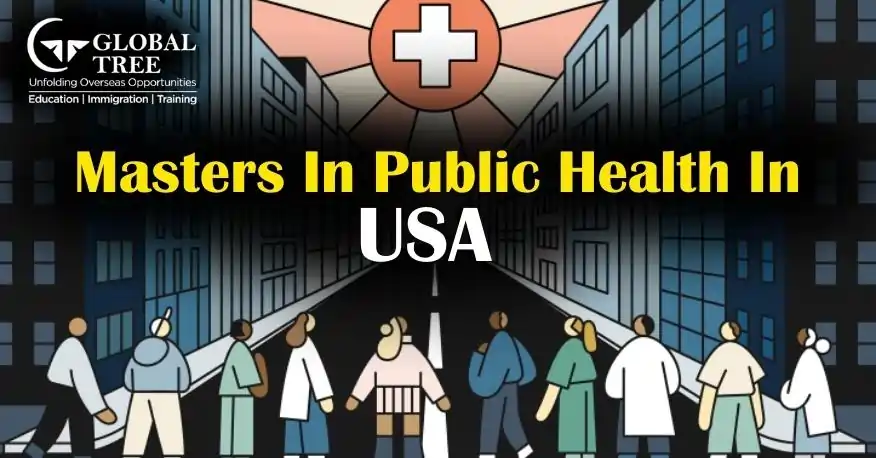Masters in Public Health in the USA: Shaping the Health of Nations

- Introduction
- About the Masters in Public Health Course
- Types of courses for a Masters in Public Health
- How to get into the course?
- Course outline for a Masters in Public Health
- Top Schools in the US for a Masters in Public Health
- Fees for Masters in public health
- Scholarships for Public Health Studies
- The average salary for a Masters in Public Health
- What can you do with a Masters in Public Health after the course?
- Specialisations for a Master of Public Health
- Masters in Public Health (MPH) vs Other Related Courses
- Frequently Asked Questions (FAQs) about Masters in Public Health in the USA
- Conclusion
Introduction
Public health plays a crucial role in improving the health and well-being of populations, addressing health disparities, and promoting disease prevention. In the United States, getting a Master of Public Health (MPH) can be a life-changing educational experience for people who are passionate about improving public health. This all-around programme gives students the information, skills, and hands-on experience they need to solve complex health problems at the local, national, and international levels. In this blog post, we'll talk about the benefits of getting an MPH in the United States, the main parts of the programme, the best schools that offer this degree, the admissions process, possible career paths, and the different specialisations you can choose from within public health.
About the Masters in Public Health Course
What does it mean?
In the United States, a Masters in Public Health programme works on epidemiology, biostatistics, environmental health, health policy, and promoting health. Students learn how to plan, implement, and evaluate public health programmes and interventions to improve the health of the population and address health disparities.
Who Needs to Study?
The Masters in Public Health programme is perfect for people who want to improve the health of their communities. It brings in people from many different backgrounds, such as health professionals, recent graduates from related areas, and people who want to get into the public health field.
Why Learn?
Getting an MPH in the United States has a lot of benefits. American universities are known around the world for their study and new ideas in public health. The programme focuses on evidence-based practises, hands-on field work, and working with the community to give students the skills they need to deal with real-world public health problems. The US also has a diverse population and a large public health infrastructure, which creates many chances for career growth and making a difference.
Quick Facts about the Masters in Public Health Course:
- The length is usually between one and two years, based on whether you study full-time or part-time.
- Core subjects include epidemiology, biostatistics, health policy, environmental health, social and behavioural sciences, global health, and programme assessment.
- You need a Bachelor's degree in any area, relevant work experience (depending on the programme), and a good grasp of the English language.
- Skills Learned: analysing data, planning and evaluating programmes, communicating about health, analysing policies, and working with the community.
Types of courses for a Masters in Public Health
- General MPH: In general MPH programmes, students learn about all of the major areas of public health. This gives them a broad understanding of the principles and practises of public health.
- Specialised MPH: Specialised MPH programmes focus on certain areas of public health, such as epidemiology, global health, health policy, environmental health, mother and child health, and social and behavioural sciences.
How to get into the course?
- To get into an MPH programme in the US, you usually need a bachelor's degree from a recognised college or university. Some universities may require related work experience or specific prerequisite courses.
- Work Experience: Some programmes prefer candidates who have worked in public health or in a health-related field before, but it's not always required.
- GRE: Some universities require the Graduate Record Exam (GRE), but more and more programmes are moving away from requiring the test.
- Statement of Purpose: Applicants for jobs in public health are often asked to write a well-written statement of purpose that describes their motivations and work goals.
- Letters of Recommendation: Applicants usually need to provide letters of recommendation from academic or professional sources.
Course outline for a Masters in Public Health
The curriculum for an MPH in the United States may be different at different schools, but it usually covers the following basic subjects:
Epidemiology is the study of disease trends, risk factors, and how health-related events happen in groups of people.
- Biostatistics: Students learn how to use statistics to study public health and analyse data.
- Health Policy: This module looks at how local, national, and world health policies are made, put into place, and evaluated.
- Environmental health is the study of how things like the quality of the air and water, the health of workers, and the safety of food affect general health.
- Social and Behavioural Sciences: This area of study looks at the social factors that affect health and how behaviour and social factors affect health.
- Global Health: Students learn about global health problems, differences in health, and ways to improve health around the world. Taking proper nutrition will help to overcome most of the problems. Joining a dietetics course will help you learn more about nutritional values.
- Programme Planning and Evaluation: This module is about making public health programmes and measures and figuring out how well they work.
Top Schools in the US for a Masters in Public Health
1. Harvard University - T.H. Chan School of Public Health:
The T.H. Chan School of Public Health at Harvard is renowned for its prestigious MPH program, which provides students with a comprehensive understanding of public health principles and practices. The program offers numerous areas of focus, including epidemiology, global health, health policy, biostatistics, environmental health, and social and behavioral sciences. Harvard's MPH program is known for its distinguished faculty, cutting-edge research opportunities, and a wide network of public health professionals and organizations.
2. Johns Hopkins University - Bloomberg School of Public Health:
The Bloomberg School of Public Health at Johns Hopkins is widely recognized as one of the leading institutions for public health education and research. Its MPH program offers a diverse range of concentrations, allowing students to specialize in areas such as infectious disease, maternal and child health, health communication, health economics, and more. Johns Hopkins is renowned for its pioneering research in public health, and students benefit from exposure to ground breaking studies and access to top-notch resources.
3. University of California, Berkeley - School of Public Health:
The School of Public Health at UC Berkeley is known for its MPH program's emphasis on social justice and public policy. The program aims to train future public health leaders who can address health disparities and advocate for health equity. UC Berkeley's MPH program covers a broad spectrum of topics, including community health sciences, environmental health sciences, health policy and management, and epidemiology.
4. University of Michigan - School of Public Health:
The School of Public Health at the University of Michigan offers an outstanding MPH program with various specializations to cater to diverse interests and career goals. Students can choose from concentrations such as health management and policy, epidemiology, biostatistics, health behavior and education, and more. The program places significant emphasis on research, community engagement, and evidence-based approaches to public health challenges.
5. Emory University - Rollins School of Public Health:
Emory's Rollins School of Public Health offers an MPH program that stands out for its focus on global health issues. Students have ample opportunities to engage in international public health projects and gain practical experience through fieldwork. The program covers core public health subjects while encouraging students to explore specialized areas such as global epidemiology, humanitarian assistance, and global health policy.
Fees for Masters in public health
In the United States, the cost of an MPH can vary a lot based on the university, the length of the programme, and whether or not the student lives in the country. Tuition for a Masters in Public Health costs between $20,000 and $60,000 per year, on average. It's important for people who want to go to college to look into scholarships, grants, and assistantships in USA which can help pay for fees.
Scholarships for Public Health Studies
Students who want to get an MPH can get help from the USA in the form of grants and other forms of financial aid. Some well-known grants and ways to get money are:
- Fulbright Scholarships: The Fulbright programme gives scholarships to foreign students who want to go to graduate school in the United States. This includes MPH programmes.
- CDC Public Health Associate Programme (PHAP): The PHAP helps recent college graduates get hands-on training in public health through paid fellowships.
- Scholarships from the Association of Schools and Programmes of Public Health (ASPPH): ASPPH gives scholarships to students who want to study public health.
- Grants offered by the university: Many universities offer grants and other forms of financial aid to help MPH students pay for school.
The average salary for a Masters in Public Health
The average pay for MPH graduates in the U.S. depends on things like the field they specialise in, their experience, where they work, and who they work for. People who work in public health and have an MPH can earn an average starting pay of between $50,000 and $70,000 per year. With experience and knowledge, pay can go up a lot, especially for people in public health organisations who are in charge.
What can you do with a Masters in Public Health after the course?
After getting an MPH in the United States, people can choose from a wide range of jobs. Some possible ways to make a living are:
- Epidemiologist: To stop the spread of diseases, epidemiologists study disease trends, do research, and look into outbreaks.
- Health Policy Analyst: Health policy analysts work with government agencies, non-profits, and advocacy groups to change health policy and make health care better.
- Programme Manager: Programme managers in public health are in charge of making sure health programmes and projects are carried out and evaluated.
- Global health experts work on international health projects that try to solve problems like health disparities and global health challenges.
- Community Health Educator: A community health educator creates and teaches health education programmes to encourage healthy habits and keep people from getting sick.
- Public Health Consultant: Public health experts help organisations and governments with public health issues by giving them their knowledge and advice.
(Read More: Study Allied Health Science Course abroad)
Specialisations for a Master of Public Health
There are many different ways to specialise in public health, so it can fit many different interests and job goals. Some famous MPH specialisations include:
- Epidemiology is the study of disease trends and how to do research on public health.
- Health Policy and Management: This course looks at how health care policies are made, how health systems are run, and how health care costs are calculated.
- Environmental Health Sciences: This course looks at how the environment affects human health and how to protect the environment.
- Global health focuses on reducing differences in health and improving health results around the world.
- Social and Behavioural Sciences: Looks at how social and behavioural factors affect health results and how people act in ways that are good for their health.
- Maternal and Child Health: Focuses on the health and well-being of mothers and children, including prenatal care and child growth.
- Biostatistics focuses on the statistical methods used in study and data analysis for public health.
- Health Education and Communication: Looks at ways to promote health and talk about it to get people involved in health projects.
Masters in Public Health (MPH) vs Other Related Courses
1. Masters in Epidemiology
- Focus: A Masters in Epidemiology focuses specifically on the study of disease patterns, risk factors, and the distribution of health-related events in populations. It emphasizes quantitative research methods and data analysis to understand the causes and trends of diseases.
- Career Focus: Graduates with a Masters in Epidemiology typically pursue careers in research institutions, government health agencies, and academia, where they work on epidemiological studies, outbreak investigations, and disease surveillance.
- MPH Distinction: An MPH has a broader scope, covering various aspects of public health, including epidemiology. It prepares graduates for diverse roles in public health practice, program management, health policy, and health promotion.
2. Masters in Health Administration (MHA)
- Focus: A Masters in Health Administration focuses on healthcare management, leadership, and the business side of healthcare organizations. It equips students with skills in healthcare policy, finance, and organizational management.
- Career Focus: MHA graduates typically pursue careers in healthcare administration, hospital management, and healthcare consulting, working in healthcare institutions and organizations.
- MPH Distinction: An MPH emphasizes public health principles, population health, and disease prevention. While both degrees can lead to management roles in healthcare, an MPH offers a broader understanding of public health issues and their impact on communities.
3. Masters in Health Policy
- Focus: A Masters in Health Policy centres on health policy analysis, health economics, and the development and evaluation of healthcare policies. Students learn about healthcare systems and the impact of policies on public health outcomes.
- Career Focus: Graduates with a Masters in Health Policy often work in health policy research, advocacy organizations, government health agencies, and health policy consulting.
- MPH Distinction: An MPH covers health policy as one of its core subjects but also includes other essential public health disciplines. MPH graduates are equipped to work in health policy, program implementation, and a wide range of public health practice areas.
(Read More: The Pros of studying Health science course abroad)
4. Masters in Global Health
- Focus: A Masters in Global Health concentrates on health issues that transcend national borders, with an emphasis on addressing health disparities and health challenges in low-resource settings.
- Career Focus: Graduates with a Masters in Global Health often work in international health organizations, NGOs, humanitarian agencies, and global health research.
- MPH Distinction: An MPH with a specialization in Global Health combines global health perspectives with a comprehensive understanding of public health practices and policies. It prepares graduates to work in diverse public health settings, including global health initiatives.
Frequently Asked Questions (FAQs) about Masters in Public Health in the USA
1. What is a Masters in Public Health (MPH)?
A Masters in Public Health (MPH) is a graduate-level degree program that focuses on the study of public health principles, practices, and policies. It equips students with the knowledge and skills to address health challenges at the population level and promotes disease prevention, health promotion, and the improvement of healthcare systems.
2. What are the prerequisites for pursuing an MPH in the USA?
The prerequisites for pursuing an MPH in the USA may vary depending on the university and program. Generally, applicants are required to have a bachelor's degree from an accredited institution. While some programs may have specific prerequisite coursework, many MPH programs accept students from diverse academic backgrounds.
3. What are the different specializations available in MPH programs?
MPH programs offer a wide range of specializations to cater to various public health interests and career goals. Some common specializations include behavioural sciences epidemiology, health policy and management, environmental health sciences, biostatistics, global health, maternal and child health.
4. Can international students pursue an MPH in the USA?
Yes, international students are welcome to pursue an MPH in the USA. Many universities have specific admissions processes for international students and may require proof of English language proficiency (e.g., TOEFL or IELTS scores).
5. Is work experience required to apply for an MPH program?
Work experience is not always mandatory for admission to an MPH program, but it can be considered a valuable asset. Some programs may prefer applicants with relevant public health or healthcare experience, as it demonstrates practical knowledge and commitment to the field.
6. How long does it take to complete an MPH program?
The duration of an MPH program for studying in USA typically ranges from one to two years, depending on whether a student is enrolled on a full-time or part-time basis.
7. Are there online MPH programs available?
Yes, many universities offer online MPH programs, providing flexibility for students who wish to study remotely or balance their studies with other commitments.
8. What are the career prospects for MPH graduates in the USA?
MPH graduates in the USA have diverse career opportunities in various sectors, including government agencies, healthcare organizations, non-profit organizations, research institutions, and international health organizations. Career options include roles in epidemiology, health policy analysis, health program management, health education, and health research.
9. Are there scholarships or financial aid available for MPH students?
Yes, there are scholarships, grants, and financial aid options available to support MPH students. Many universities and public health organizations offer scholarships specifically for MPH students. Additionally, students can explore federal financial aid programs, assistantships, and other funding opportunities.
10. How does an MPH differ from other healthcare-related Masters degrees?
An MPH focuses on public health principles and approaches, with a population-level focus on health promotion and disease prevention. Other healthcare-related Masters degrees, such as Masters in Health Administration (MHA) or Masters in Health Policy, may have more of an administrative or policy-oriented focus within the healthcare system.
11. Can MPH graduates work internationally?
Yes, MPH graduates often have the opportunity to work internationally, particularly in global health organizations, NGOs, and international health agencies. The diverse skill set gained through an MPH program is valuable in addressing health challenges on a global scale.
12. How can I choose the right MPH program for my career goals?
When choosing an MPH program, consider factors such as the program's specializations, faculty expertise, research opportunities, internship options, and networking opportunities. Additionally, consider the location and resources available at the university to support your academic and career aspirations.
Conclusion
Getting a Masters in Public Health in the United States is a life-changing training experience for people who want to work in public health. The USA's well-known colleges, cutting-edge research, and large public health infrastructure help students do well in the field. By knowing how the courses are set up, how to get in, what kinds of jobs might be available, and what kinds of specialisations are available in public health, students can make smart choices and start a rewarding journey to improve the health of nations. Graduates with an MPH have the skills and knowledge to deal with complicated public health problems and make important efforts to improving the health and well-being of communities both locally and around the world.









